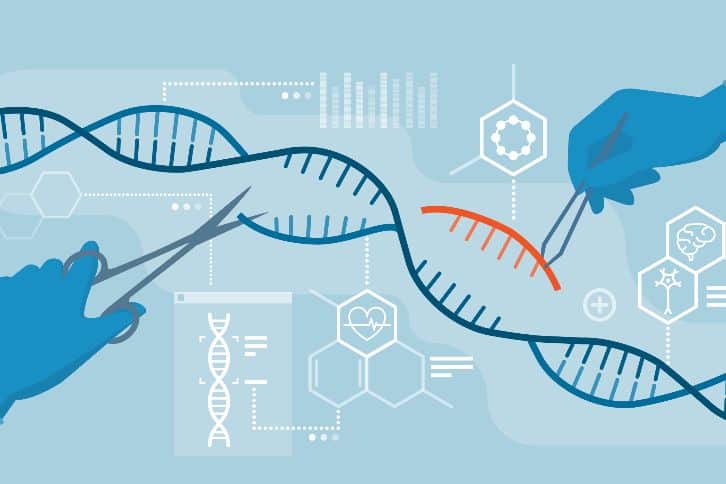First approval of a CRISPR-based gene therapy
To cure blood diseases

This is the first time that the UK drug regulator has approved a gene therapy based on the CRISPR-Cas9 editor. This very recent biomedical technology thus receives an important confirmation. Developed by Vertex Pharmaceuticals and CRISPR Therapeutics, the therapy has been named Casgevy and is intended to treat sickle cell anaemia and beta-thalassaemia, which are haemoglobinopathies. People with sickle cell anaemia suffer from vascular occlusion pain and those with beta-thalassaemia frequently need blood transfusions.
“This is a landmark approval that opens the door to future applications of CRISPR therapies for the potential cure of many genetic diseases,” said Kay Davies, a geneticist at the University of Oxford, UK, as published in the journal Nature.
The Medicines and Healthcare products Regulatory Agency (MHRA) approved the therapy following clinical trials in which a single treatment was tested by intravenous injection. Twenty-nine out of 45 participants were followed in the sickle cell trial and the result was that the drug Casgevy completely cured 28 for at least one year after treatment. In the case of beta-thalassaemia, the therapy was applied in a severe form of the disease that requires blood transfusions once a month. There were 54 participants in the trial, 42 of whom took part for as long as it took to provide interim data. Of these 42, 39 did not require red blood cell transfusions for at least one year, and in the other three the need for transfusions was reduced by 70%.
To perform gene editing, the approved drug uses the CRISPR editor, an invention that will win the Nobel Prize in Chemistry in 2020. Both beta-thalassaemia and sickle cell anaemia are caused by errors in the genes that code for haemoglobin. In beta-thalassaemia, the mutations cause low haemoglobin levels, irregular heartbeat, tiredness and shortness of breath. In sickle cell anaemia, red blood cells become misshapen and stick together, clogging vessels. This causes severe pain and reduces the oxygen supply to the various organs and tissues.
For the administration of Casgevy, stem cells are extracted from the bone marrow of people suffering from these diseases and CRISPR-Cas9 is applied, thus editing the genes that code for haemoglobin. The drug targets the BCL11A gene, whose function is to prevent the production of a type of foetal haemoglobin. By cutting the two strands of DNA, the production of foetal haemoglobin is released. In people with sickle cell anaemia or beta-thalassaemia, this type of haemoglobin does not have the abnormalities of adult haemoglobin. As soon as the modified stem cells are introduced into the bone marrow, they begin to produce red blood cells with foetal haemoglobin and the oxygen supply is increased, thus alleviating the symptoms. The UK regulatory agency said in a statement: “Patients may need to spend at least a month in hospital while the treated cells settle in the bone marrow and begin to produce red blood cells with the stable form of haemoglobin.
Although no major safety concerns have been reported, research participants experienced some side effects such as fever, nausea, increased risk of infection and fatigue. There is also some concern that the CRISPR-Cas9 tool may make unintended genetic changes with unexpected consequences. “It is well known that CRISPR can lead to spurious genetic modifications with unknown consequences for the treated cells,” said David Rueda, a geneticist at Imperial College London. He added: “It would be essential to see whole genome sequencing data from these cells before reaching a conclusion. However, I am cautiously optimistic about this announcement.
In addition to the British regulatory agency, which has already approved the drug, the US FDA as well as the European Medicines Agency are also considering approval. However, application of this therapy will for the time being only be possible in wealthy countries with developed health systems, as it requires technology for stem cell procurement and gene editing. The high cost of Casgevy, whose common name is exacel, will be a major constraint. “We have not set a list price for the UK at this time and are focused on working with health authorities to ensure reimbursement and access for eligible patients as quickly as possible,” said a Vertex spokesperson. It is estimated that, in the UK, this could be in the region of $2 million per patient, a similar cost to other gene therapies.
From a bioethical point of view, such somatic stem cell therapies are not a major problem, as long as the balance of risks and potential benefits is carefully weighed. Furthermore, it should be ensured that they gradually benefit all those suffering from these diseases, as far as possible.
Related

His Hope Does Not Die!
Mario J. Paredes
24 April, 2025
6 min

The Religious Writer with a Fighting Heart
Francisco Bobadilla
24 April, 2025
4 min

Francis. The Human and Religious Imprint of a Papacy
Isabel Orellana
24 April, 2025
5 min

Cardinal Felipe Arizmendi: With the Risen Christ, There Is Hope
Felipe Arizmendi
24 April, 2025
6 min
 (EN)
(EN)
 (ES)
(ES)
 (IT)
(IT)

